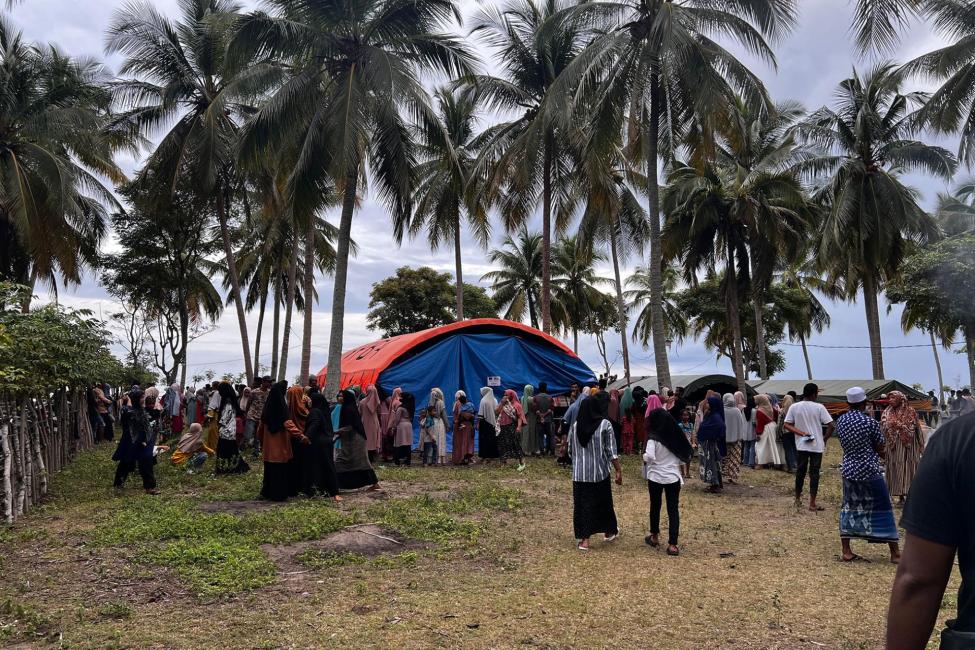-
Who we are
WHO WE AREThe International Organization for Migration (IOM) is part of the United Nations System as the leading inter-governmental organization promoting since 1951 humane and orderly migration for the benefit of all, with 175 member states and a presence in over 100 countries. IOM joined the United Nations system in September 2016.
About
About
IOM Global
IOM Global
-
Our Work
Our WorkAs the leading inter-governmental organization promoting humane and orderly migration, IOM plays a key role to support the achievement of the 2030 Agenda through different areas of intervention that connect both humanitarian assistance and sustainable development.
Cross-cutting (Global)
Cross-cutting (Global)
- Data and Resources
- Take Action
- 2030 Agenda
Western Balkans Partners Accept Action Plan on Sustainable Migration Governance at the Third Sarajevo Migration Dialogue
Sarajevo – The International Organization for Migration's (IOM) partners in the Western Balkans today accepted the Action Plan for Sustainable Migration Governance in the Western Balkans 2023-2025 at the conclusion of the third Sarajevo Migration Dialogue in Jahorina, Bosnia and Herzegovina.
“The Sarajevo Migration Dialogue is critical for Western Balkans partners to exchange and identify key measures to advance comprehensive, sustainable, and solutions-oriented approaches to effectively manage migration,” said Ugochi Daniels, Deputy Director General for Operations at IOM.
“This Conference paves the way for actions at regional and country level for the immediate and medium-term future, where your partners in the EU and the UN will give added value for long-lasting results. I would like to reiterate IOM's commitment to supporting all authorities and partners in the region wherever our assistance is most needed.”
The two-day conference, jointly organized by the Ministry of Security of Bosnia and Herzegovina and the Swedish Presidency of the Council of the European Union (EU), and facilitated by IOM, is dedicated to advancing the commitments that Western Balkans partners made last year in Skopje towards the sustainable governance of migration.
Since 2015, the Western Balkans has become the main transit region for migrants seeking to reach Western Europe. While authorities have shown remarkable ability to respond to the challenges posed by sudden and large migratory movements, continued efforts are needed in three key areas; tackling trafficking and smuggling rings; establishing sustainable return pathways for those who do not qualify to stay in the region and ensuring protection for those unable to return to their countries of origin.
The Skopje Declaration - adopted by the Western Balkans partners in November 2022 – recognized that long-term vision for development in the region needs strong and sustainable migration governance and policy, linked to long-term development of host and transit communities.
Nenad Nešić, Minister of Security of Bosnia and Herzegovina noted the humanitarian aspect of migration, as well as the political and security challenges. Irregular migration has the potential to bring higher levels of criminality, mainly in the realms of people smuggling and human trafficking. The illegal trade of drugs, weapons, and other illegal activities were also part of the problem, he said.
“I hope that by the end of this conference, we will be even more interconnected, understanding that only together and united can we tackle such a large problem. The Western Balkans is ready for this, and I am confident that we will demonstrate this with our work,” he said.
Speaking for the Swedish EU Presidency Anders Hall, State Secretary on Migration and Asylum issues stressed that the Western Balkans forms an essential partnership with the EU in joint efforts to maintain a stable and prosperous Europe.
“This region's importance has only increased considering the new environment in Europe,” said Hall. “We have had good and frank discussions on how to handle today's migration challenges. It's important to bear in mind that migrants come not only with challenges, but also with opportunities”.
The Action Plan on Sustainable Migration governance adopted today builds on the key priorities of the EU Action for the Western Balkans adopted in December 2022. It complements joint efforts between the EU and Western Balkans partners in adopting a comprehensive approach to managing mixed migration flows.
“Migration has long been a shared challenge, while also clearly offering numerous benefits and being an opportunity for our citizens and economy,” noted Ambassador Luigi Soreca, on behalf of the European External Action Service. “We have a strong common interest in cooperating closely on all aspects looking for a balanced approach. It is a question of managing migration together.”
For more information, please contact
Francois Lhoumeau at frlhoumeau@iom.int, Tel +3876168453 or Joe Lowry at jlowry@iom.int, Tel: +43660 3776404

